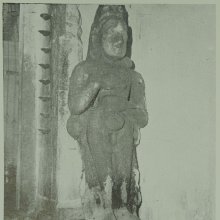Jvarahara, Jvara-hara: 6 definitions
Introduction:
Jvarahara means something in Hinduism, Sanskrit. If you want to know the exact meaning, history, etymology or English translation of this term then check out the descriptions on this page. Add your comment or reference to a book if you want to contribute to this summary article.
Images (photo gallery)
In Hinduism
Ayurveda (science of life)
Source: Wisdom Library: Āyurveda and botanyJvarahara (ज्वरहर) is the Sanskrit name for a group of medicinal plants, classified as “febrifuge”, and originally composed by Caraka in his Carakasaṃhitā sūtrasthāna IV. The name is derived from the words jvara, translating to “fever”, and hara, translating to “curing”, “removing” or “destroying”. It is a technical term used throughout Āyurveda. Examples of plants pertaining to this category include Sarivā (Asclepias pseudosarsa), Pāṭhā (Stephania hernandifolia), Pīlu (Salvadora indica), Abhayā, Āmalaka and Vibhītaka. The collection of herbs named Jvarahara is one of the fifty Mahākaṣāya.
Source: Ancient Science of Life: Vaidyavallabha: An Authoritative Work on Ayurveda TherapeuticsLaṅghana (लङ्घन) or Jvaraharatantra refers to “fever subsiding (method)”, and is dealt with in the 17th-century Vaidyavallabha (chapter 1) written by Hastiruci.—The Vaidyavallabha is a work which deals with the treatment and useful for all 8 branches of Ayurveda. The text Vaidyavallabha (mentioning jvarahara-tantra) has been designed based on the need of the period of the author, availability of drugs during that time, disease manifesting in that era, socio-economical-cultural-familial-spiritual-aspects of that period Vaidyavallabha.
Source: gurumukhi.ru: Ayurveda glossary of termsJvarahara (ज्वरहर):—Anti-pyretic;

Āyurveda (आयुर्वेद, ayurveda) is a branch of Indian science dealing with medicine, herbalism, taxology, anatomy, surgery, alchemy and related topics. Traditional practice of Āyurveda in ancient India dates back to at least the first millenium BC. Literature is commonly written in Sanskrit using various poetic metres.
Languages of India and abroad
Sanskrit dictionary
Source: DDSA: The practical Sanskrit-English dictionaryJvarahara (ज्वरहर).—a. febrifuge.
Jvarahara is a Sanskrit compound consisting of the terms jvara and hara (हर).
Source: Cologne Digital Sanskrit Dictionaries: Monier-Williams Sanskrit-English DictionaryJvarahara (ज्वरहर):—[=jvara-hara] [from jvara > jvar] mfn. febrifuge, [Caraka vi, 3.]
[Sanskrit to German]
Sanskrit, also spelled संस्कृतम् (saṃskṛtam), is an ancient language of India commonly seen as the grandmother of the Indo-European language family (even English!). Closely allied with Prakrit and Pali, Sanskrit is more exhaustive in both grammar and terms and has the most extensive collection of literature in the world, greatly surpassing its sister-languages Greek and Latin.
See also (Relevant definitions)
Starts with: Jvaraharastotra.
Ends with: Jirnajvarahara, Navajvarahara, Sarvajvarahara.
Full-text: Sarvajvarahara, Jirnajvarahara, Curakaram, Mahakashaya, Hara.
Relevant text
Search found 2 books and stories containing Jvarahara, Jvara-hara; (plurals include: Jvaraharas, haras). You can also click to the full overview containing English textual excerpts. Below are direct links for the most relevant articles:
Rasa Jala Nidhi, vol 4: Iatrochemistry (by Bhudeb Mookerjee)
Treatment for fever (23): Nava-jvara-hara rasa < [Chapter II - Fever (jvara)]
Treatment for fever (144): Sarva-jvara-hara lauham < [Chapter II - Fever (jvara)]
Middle Chola Temples (by S. R. Balasubrahmanyam)
Temples in Gangaikondan < [Chapter II - Temples of Rajaraja I’s Time]
Temples in Seramadevi < [Chapter II - Temples of Rajaraja I’s Time]
Parivaralayattu Pillaiyar < [Tanjavur/Thanjavur (Rajarajesvaram temple)]


